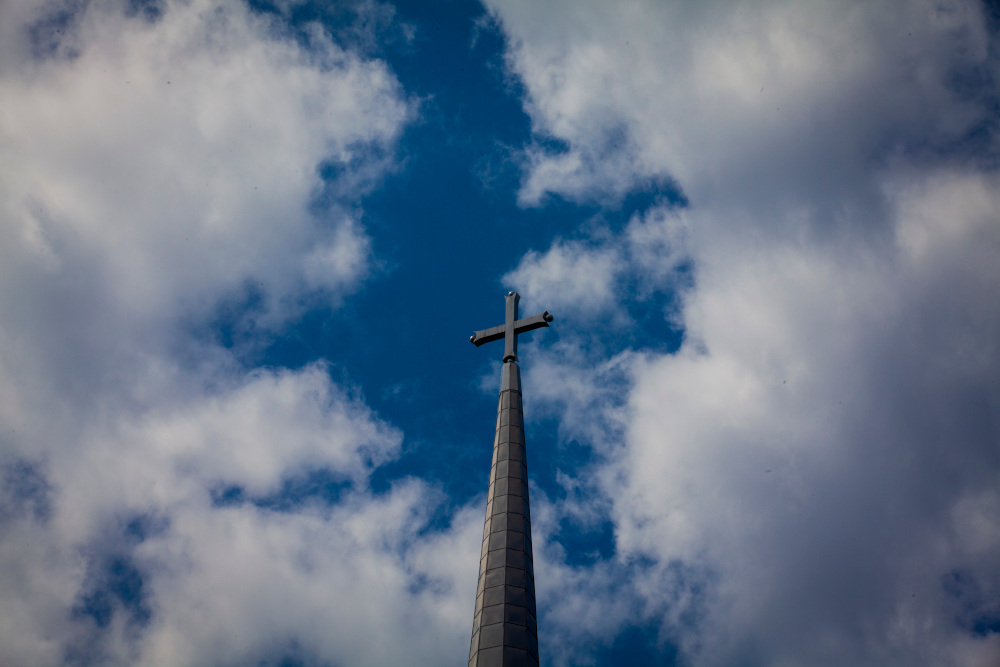
A church steeple is seen in this photo illustration. The Texas Supreme Court agreed June 5, 2020, to review an appeal by the Diocese of Lubbock over a former deacon's defamation lawsuit against it. (CNS/Chaz Muth)
The Texas Supreme Court agreed June 5 to review an appeal by the Diocese of Lubbock over a former deacon's defamation lawsuit against it.
The suit, which lower courts said could proceed, sought more than $1 million in damages from the diocese claiming it had falsely included the former deacon in its published list last year of clergy with credible allegations of sexual abuse of minors.
Jesus Guerrero filed a defamation lawsuit last March, two months after all 15 dioceses in the state published lists of clergy members and deacons with credible abuse allegations.
In a response filed with the Lubbock District Court last April, the diocese said it was seeking dismissal of the suit calling it an ecclesiastical matter that civil courts couldn't interfere with.
A report last year by KAMC-TV, a CBS affiliate in Lubbock, said the diocese revised its list in April 2019 with a clarification related to Guerrero. The diocese said it was using the Catholic Church's religious definition of a minor, which includes individuals over age 18 who lack the mental faculties of an adult.
According to the petition to the court, Guerrero, who was ordained as a deacon in 1997, had a sexual misconduct allegation made against him in 2003, regarding a woman "known to have a history of mental and emotional problems."
After an investigation, the bishop suspended Guerrero, who was reinstated in 2006. But according to the petition, the diocese received another sexual misconduct allegation in 2007 by the same woman. After a second investigation, the diocese permanently withdrew Guerrero's diaconal duties.
The former deacon claims his inclusion in the list is defamatory, because his accuser was over 18 at the time of the allegations.
State courts in Texas allowed Guerrero's defamation claim to go forward despite the argument by the Lubbock Diocese that it has the right to communicate freely with its members about matters of church discipline.
"We are committed to transparency for the trust and safety of the members of our parishes," said Lubbock Bishop Robert M. Coerver in a June 8 statement. "At a time when many religious messages are being shared digitally, courts must protect churches' ability to communicate effectively with their members."
In its brief, the diocese argued that courts cannot interfere in a church's internal discipline of clergy, and that punishing the diocese for including Guerrero's name on its list could chill efforts at continued transparency.
Members of religious groups from Jewish and Protestant traditions filed friend-of-the court briefs in support of the diocese asking the court to uphold the right of all religious groups to demonstrate transparency on issues related to clergy discipline.
"Churches should not be punished for doing the right thing," said Montse Alvarado, vice president and executive director at Becket, which is representing the diocese. "Clergy hold a unique position of trust within their communities and churches should be free to notify members and other affected individuals when clergy violate that trust. That is true even when the warning goes beyond the four walls of the church building."
The statewide release of names of clergy or deacons with credible allegations of sexual abuse of a minor was described by Archbishop Gustavo Garcia-Siller of San Antonio at the time as "the just and right thing to do," and that it is a "move forward in building a healthier community, a healthier society."
The lists were compiled separately by each individual diocese. Many dioceses worked in cooperation with diocesan lay review boards, with some also working with independent consultants.
Each diocese worked with the general understanding that a "credible allegation" is one that, after reviewing reasonably available and relevant information, and in consultation with diocesan lay review boards and/or other professionals, the diocese has reason to believe is true.
The archbishop said that while each diocese prepared its list independently, the goal of releasing the lists on the same day was significant and was done in consideration of all those affected by the abuse, including abuse survivors, family members, friends and parishioners.
Advertisement





